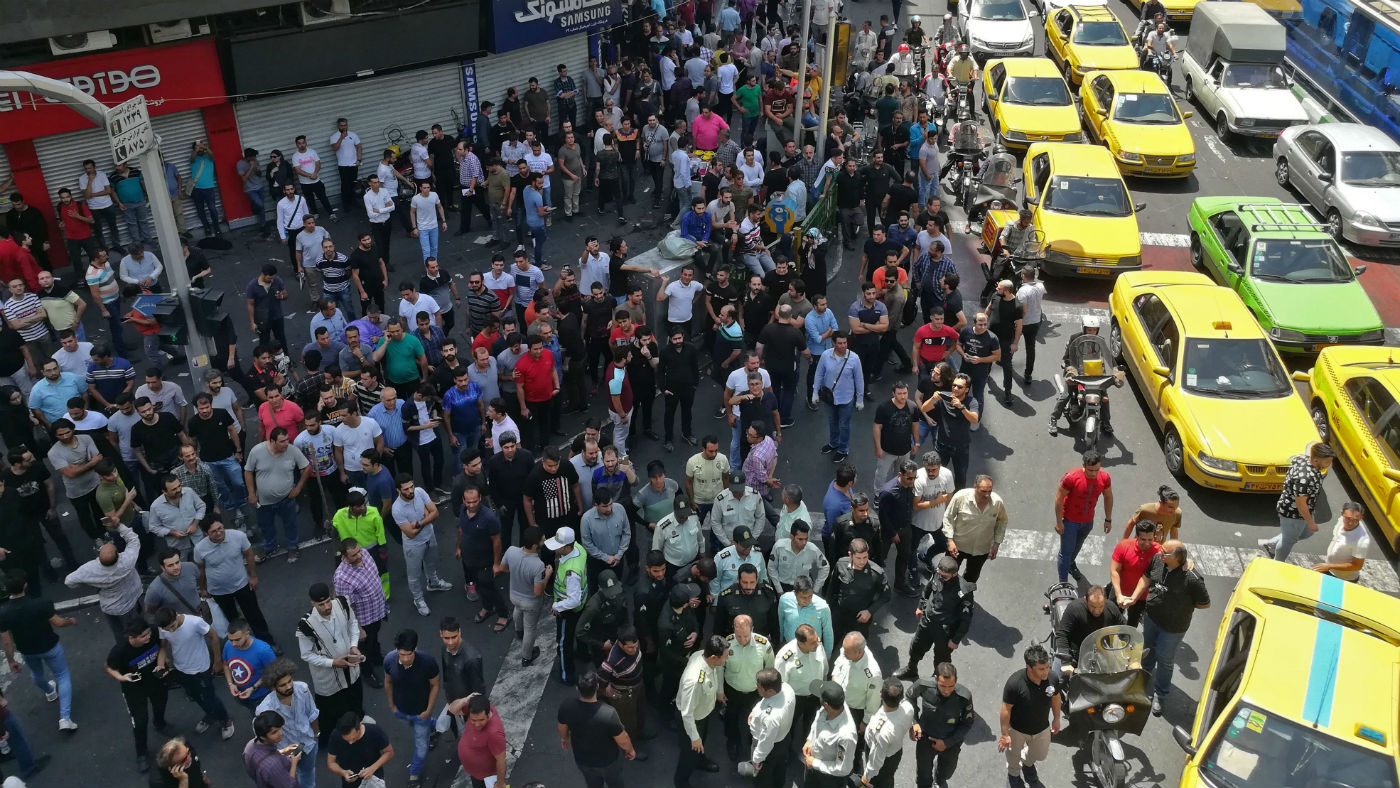Tehran protests: why are Iranians angry?
Thousands demonstrate in capital after seeing their savings dwindle

A free daily email with the biggest news stories of the day – and the best features from TheWeek.com
You are now subscribed
Your newsletter sign-up was successful
Iranians have taken to the streets of Tehran this week in the biggest protests seen in the capital since 2012.
Thousands marched towards the gates of the Iranian parliament on Monday, forcing many traders to shut up shop. Police retaliated with tear gas, dispersing the crowds, but the protests continued yesterday and are spreading to other cities.
So why are Iranians so angry?
The Week
Escape your echo chamber. Get the facts behind the news, plus analysis from multiple perspectives.

Sign up for The Week's Free Newsletters
From our morning news briefing to a weekly Good News Newsletter, get the best of The Week delivered directly to your inbox.
From our morning news briefing to a weekly Good News Newsletter, get the best of The Week delivered directly to your inbox.
Donald Trump’s announcement last month that the US was withdrawing from the 2015 Iran nuclear deal has triggered a sharp decline in the value of the Iranian rial, which in turn has seen import costs skyrocket.
There were about 65,000 rials to $1 on Iran’s unofficial currency exchange market prior to Trump’s decision, compared with 90,000 rials as of Monday.
“People in the Middle Eastern nation have watched their savings dwindle,” says Sky News.
There are also fears that the threatened return to US sanctions will cut Iran’s earnings from oil experts, further damaging the already declining economy.
A free daily email with the biggest news stories of the day – and the best features from TheWeek.com
“We are all angry with the economic situation. We cannot continue our businesses like this,” a merchant in Tehran’s Grand Bazaar told Reuters.
President Hassan Rouhani insists his government will be able to withstand the rapid currency drop and any new US sanctions. The Iranian leader spoke out after the Central Bank of Iran announced that it will create a secondary market for foreign exchange to help get around a dollar shortage.
Yesterday Rouhani declared: “We are fighting against the United States, it wants to make an economic war. The US cannot defeat our nation; our enemies are not able to force us to their knees.”
But such reassurances have done little to calm many Iranians’ fears.
-
 The 8 best TV shows of the 1960s
The 8 best TV shows of the 1960sThe standout shows of this decade take viewers from outer space to the Wild West
-
 Microdramas are booming
Microdramas are boomingUnder the radar Scroll to watch a whole movie
-
 The Olympic timekeepers keeping the Games on track
The Olympic timekeepers keeping the Games on trackUnder the Radar Swiss watchmaking giant Omega has been at the finish line of every Olympic Games for nearly 100 years
-
 Will increasing tensions with Iran boil over into war?
Will increasing tensions with Iran boil over into war?Today’s Big Question President Donald Trump has recently been threatening the country
-
 Corruption: The spy sheikh and the president
Corruption: The spy sheikh and the presidentFeature Trump is at the center of another scandal
-
 Rubio boosts Orbán ahead of Hungary election
Rubio boosts Orbán ahead of Hungary electionSpeed Read Far-right nationalist Prime Minister Viktor Orbán is facing a tough re-election fight after many years in power
-
 Greenland’s capital becomes ground zero for the country’s diplomatic straits
Greenland’s capital becomes ground zero for the country’s diplomatic straitsIN THE SPOTLIGHT A flurry of new consular activity in Nuuk shows how important Greenland has become to Europeans’ anxiety about American imperialism
-
 Epstein files topple law CEO, roil UK government
Epstein files topple law CEO, roil UK governmentSpeed Read Peter Mandelson, Britain’s former ambassador to the US, is caught up in the scandal
-
 Iran and US prepare to meet after skirmishes
Iran and US prepare to meet after skirmishesSpeed Read The incident comes amid heightened tensions in the Middle East
-
 Which way will Trump go on Iran?
Which way will Trump go on Iran?Today’s Big Question Diplomatic talks set to be held in Turkey on Friday, but failure to reach an agreement could have ‘terrible’ global ramifications
-
 Israel retrieves final hostage’s body from Gaza
Israel retrieves final hostage’s body from GazaSpeed Read The 24-year-old police officer was killed during the initial Hamas attack